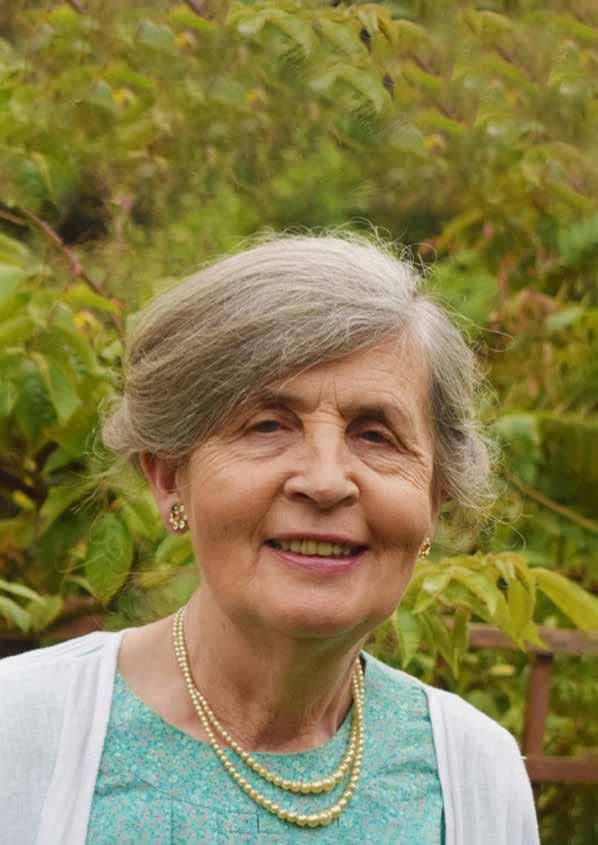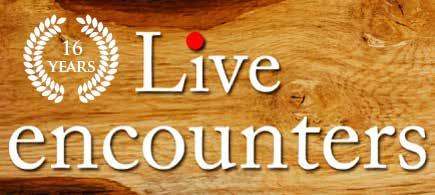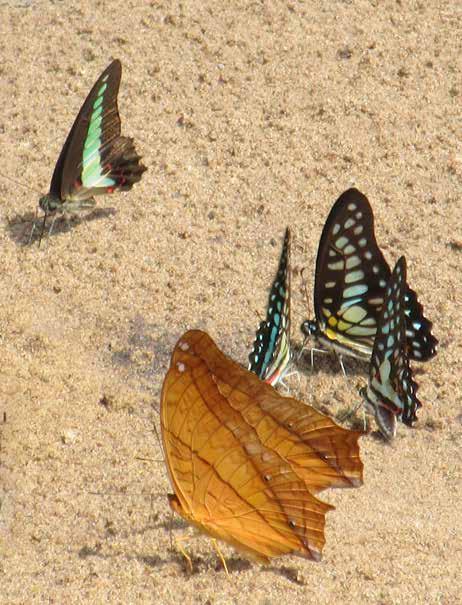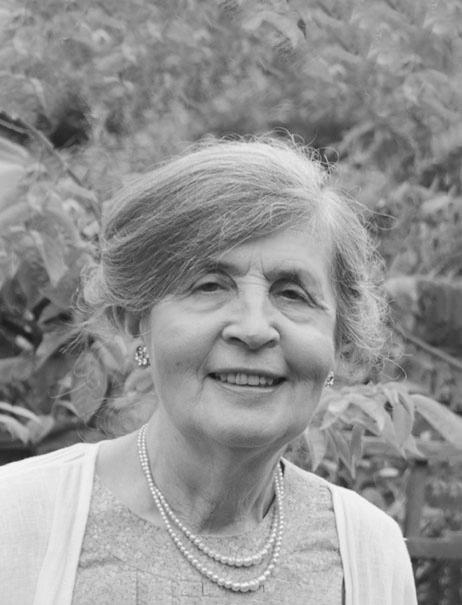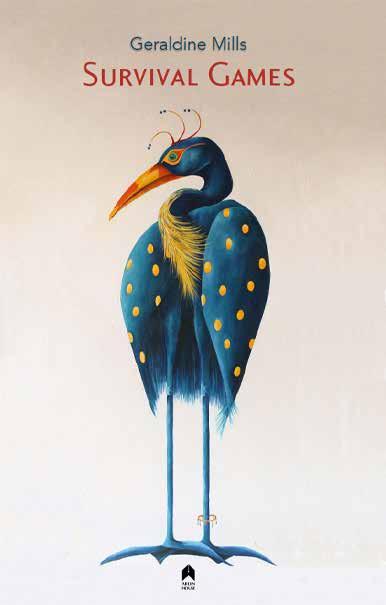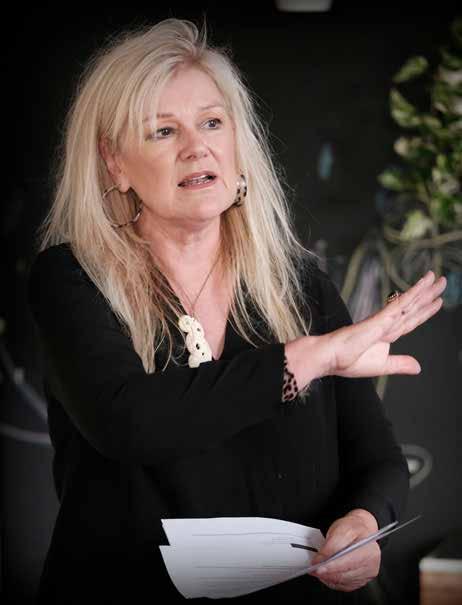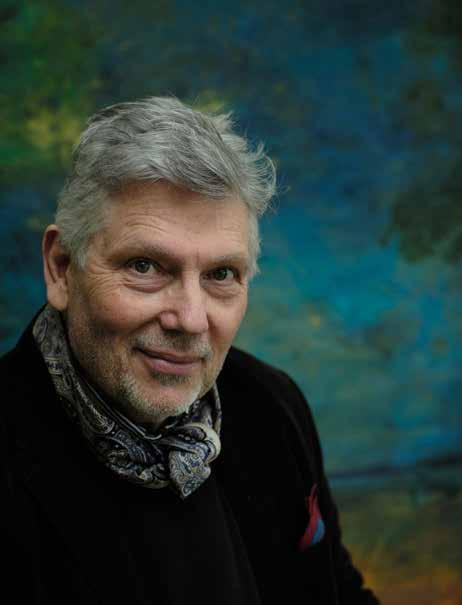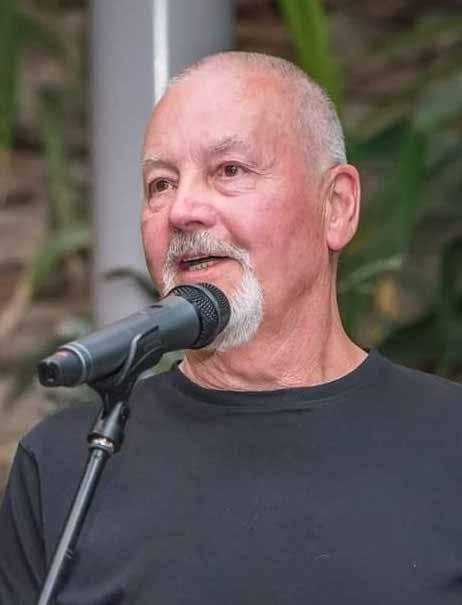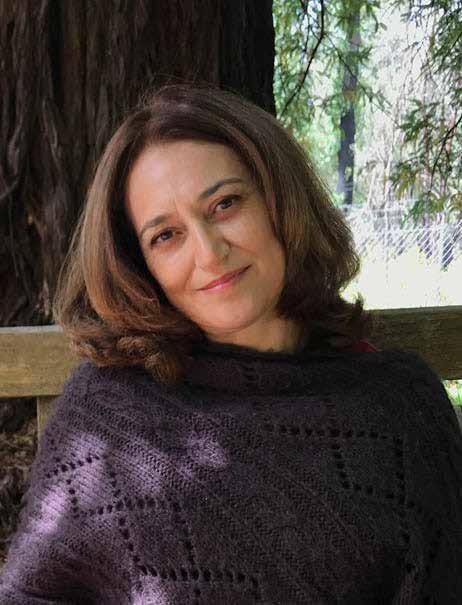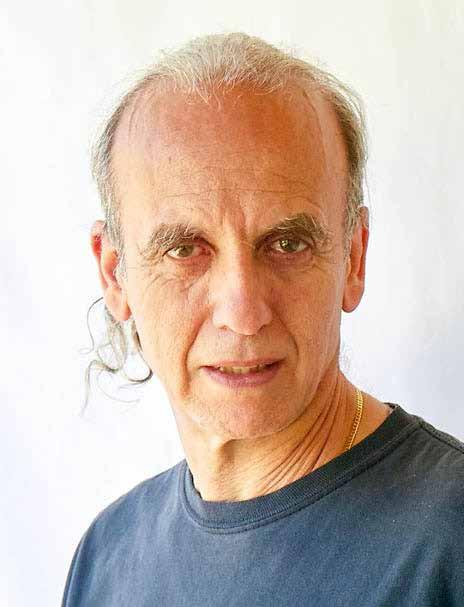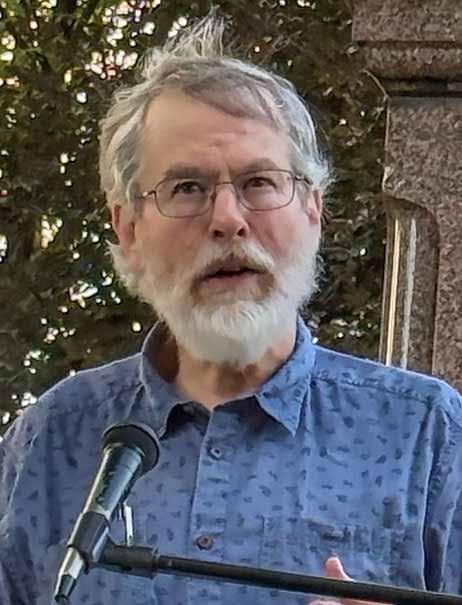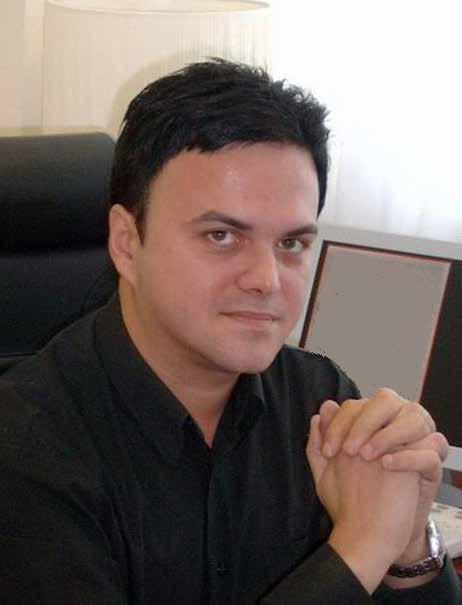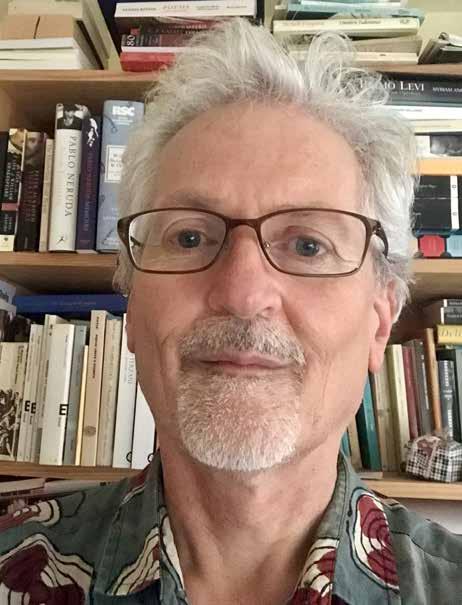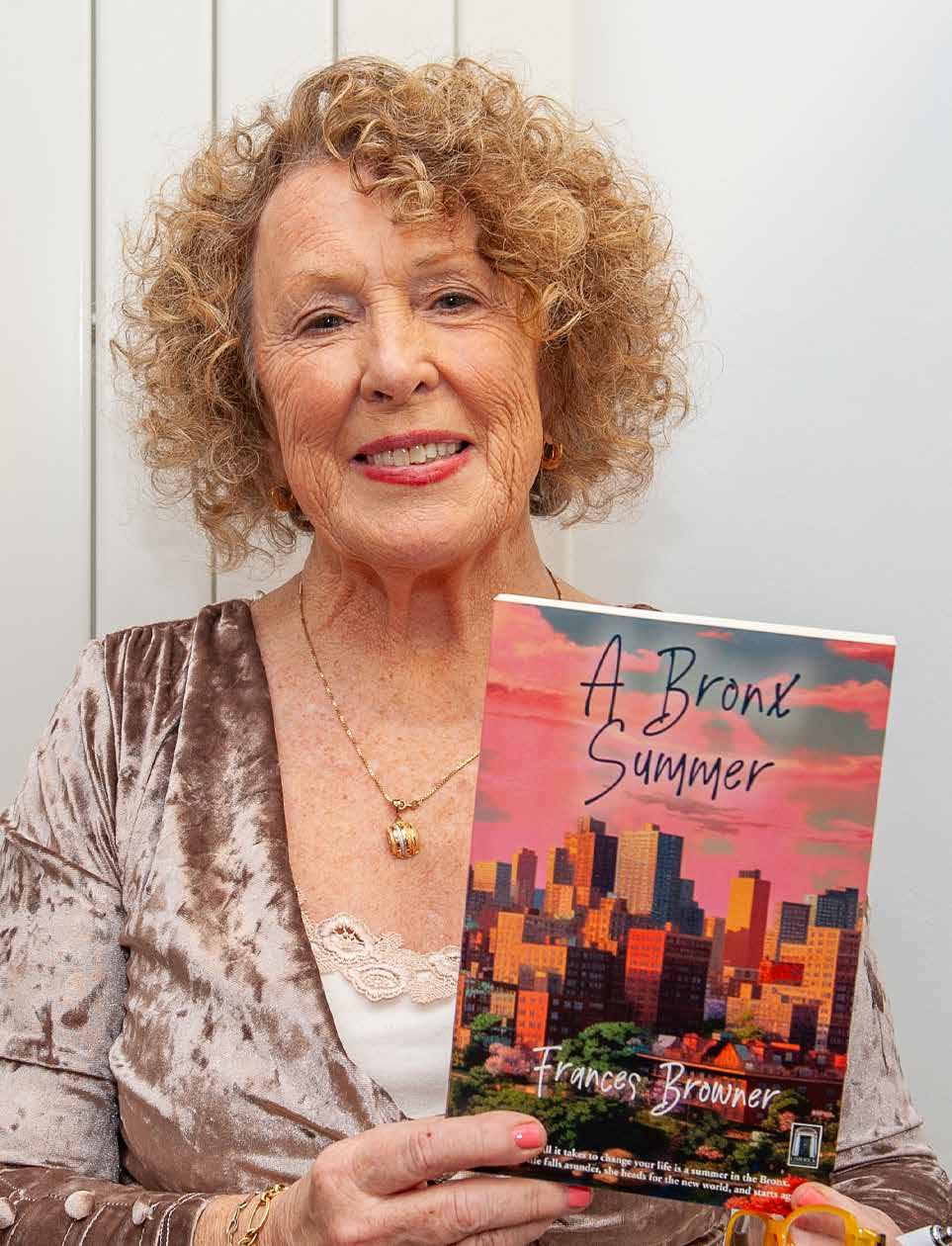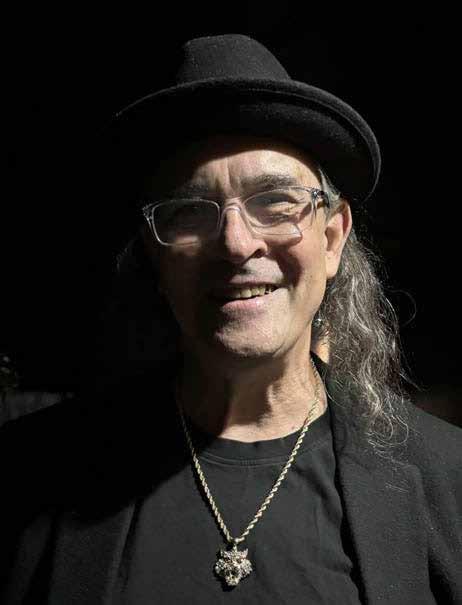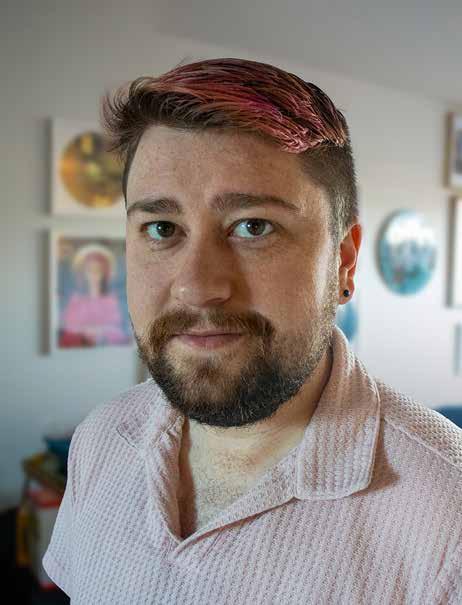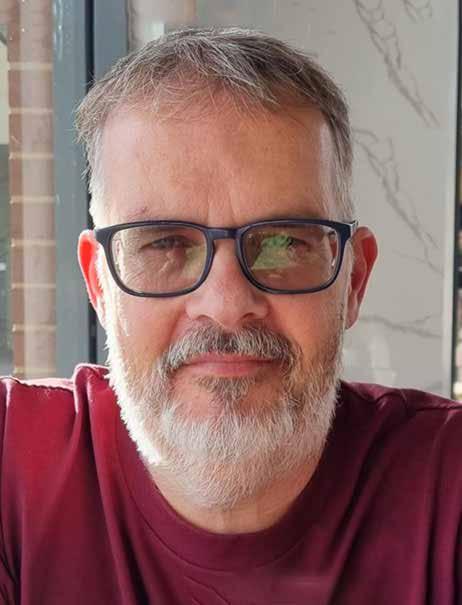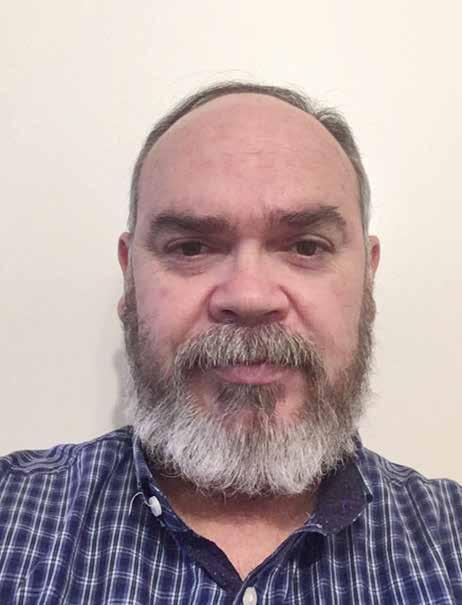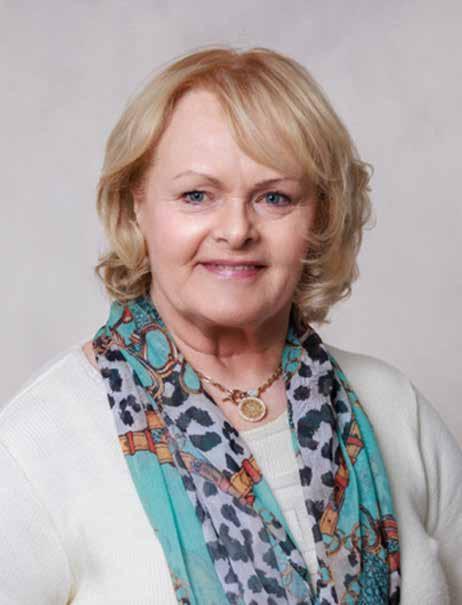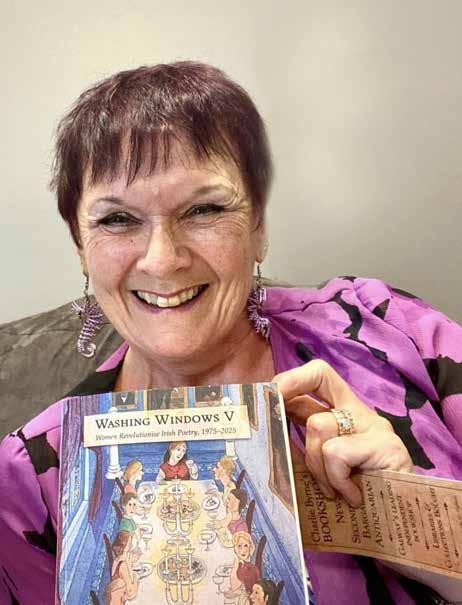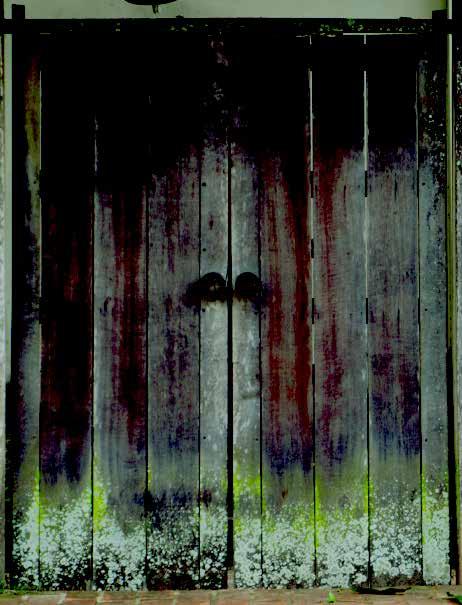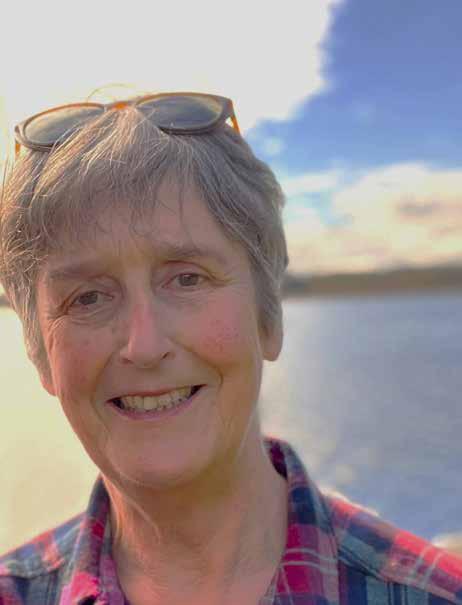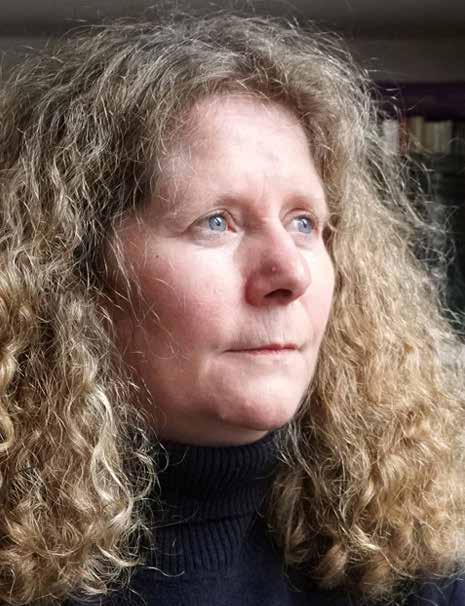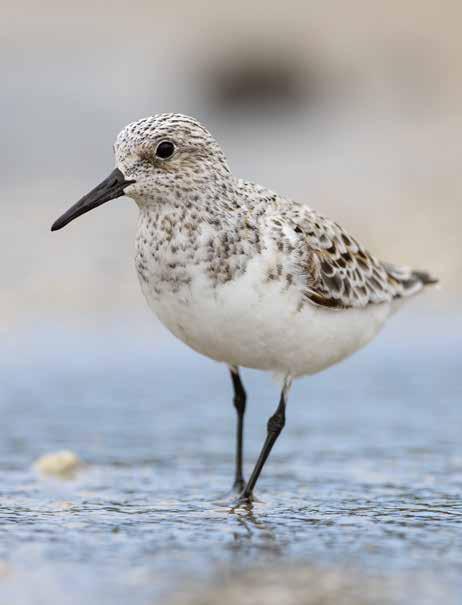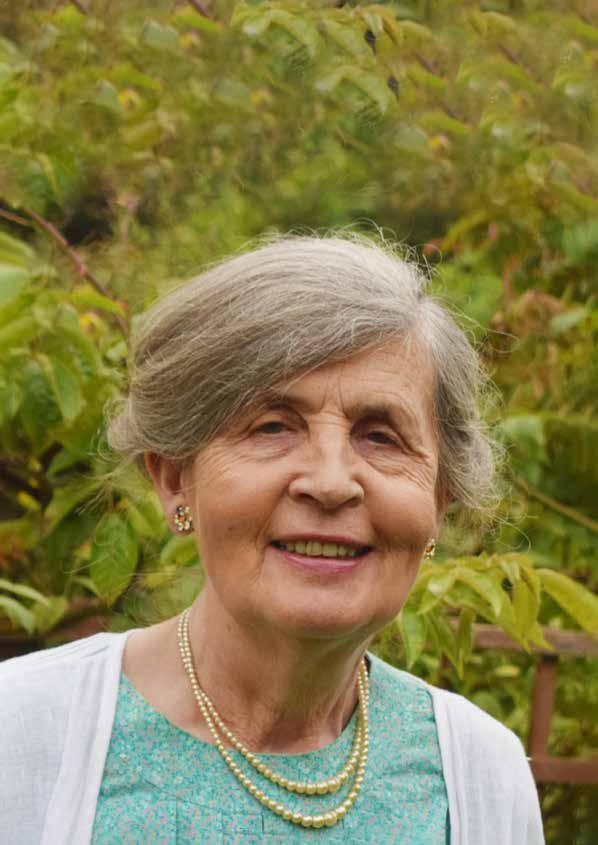Filling the Poetry Well
There was a field. There was a woman. She had a dream to build a garden to celebrate Brigit, goddess/saint of Celtic Ireland. Land was bought, plans drawn up, trees planted, a garden shaped to honour the seasons of the Celtic calendar. Saplings soon rooted, thrushes came, a robin. Tortoiseshell butterflies, orchids. The vision came into being.
Brigit is the goddess/saint of healers, smiths, poets and childbirth. There is the story of Brigit, the saint, who requested a piece of land from the king of Leinster to build her convent. When he refused, she asked if he would give her as much space as her cloak would cover. He agreed. She spread it on the ground in front of her and it started to stretch across the land until it had covered many acres.
Like the cloak, this field in County Galway, Ireland grew too. From its small beginnings it now claims 11 acres of native woodland, meadows, pond, and the four gardens of Samhain, Imbolg, Bealtaine and Lunasa, the seasons that celebrate the Celtic year. The reason I mention this is that the founder, the woman with the dream, Jenny Beale, asked me to be part of a new poetry trail around the garden this autumn with seven other Galway poets. Our task was to write new poems in response to the garden and a selection of them would be chosen and displayed for visitors.
For months I had been searching for a road that would lead me back into writing. I knocked on many doors, the words didn’t answer. I lowered the bucket into the well and only pulled up silt and dead insects. I gave the page roses; it gave me back snakes. I offered the white space apples; it spat back scorpions.
Carl Jung said that ‘the creative mind plays with the objects it loves’, and so before I could start any work on the garden poems, I knew I needed to come to it from a sense of richness, instead of poverty. The way that has worked for me in the past is to play with the things that bring me joy: words and their meaning.
Since my early college days, when I studied science, I have never failed to be amazed by the beauty of the word ‘photosynthesis’, which means: to make with light, and it does just that. It was the Dutch scientist, Dr Jan Ingen Housz who discovered that light is necessary for plants to give out oxygen. That carbon dioxide and water in the presence of sunlight striking chlorophyll are miraculously converted to glucose and give out oxygen as a byproduct. It is what keeps us alive. Creates food for the living chain. Allows us to breathe. Studying the glucose molecule fills me with awe. How does this happen? How did this come about? Mere accident or a brilliant designer? I will never know but it is the jewel in the crown of biochemistry that makes up life as we know it.
It reawakens my curiosity.
Boustrophedon is a word I can barely pronounce but I am entranced by the way it gets its name from the Greek word for ‘ox’ and ‘turn’. It was a style of writing used by ancient Greek inscribers, especially on stone, before the standard left to right style came into use, as we know it today in this part of the world. Boustrophedon is where alternate lines of writing are reversed, with letters also written in reverse. Thus, the pattern builds, turning alternate lines in the same way the working animal alternates its ploughing along the field.
I take out one of my old poems and try it. Every alternate line and letter I write backwards. It is strangely satisfying. There is complete focus needed to write each letter in reverse. My mind becomes accustomed to it, everything else blocked out as I shape letters as if a child who has just begun to write. I come to the end of the line. Turn it and the letter just like the ox ploughing. It releases something in me. The beginning of richness.
I learn new words for yellow – Realgar, Orpiment, Gamboge.
My imagination continues to be sparked by the vivid travels of Albrecht Dürer. When his patron, Maximillian died, this painter left the impoverished streets of Nurenburg in 1520, took to travelling with his wife and maid. A year long trip by horse, by boat to the coast to search out a new patron. He traded along the way his priceless art for two parrots in a cage, a piece of red chalk, a buckler of fish-skin. He bought himself a pair of socks for one stiver and stopped to sketch the bones of a giant. The sun burning his neck as he drew. Birds clamouring to be heard. I wonder what he would have made of the huge scapula, that enormous thigh bone?
I discover Enheduanna, who is celebrated as the earliest known poet in history. Born in 2286 BC, around the time of the invention of writing, her father, Sargon, ruled over ancient Mesopotamia (encompassing modernday Iraq, Kuwait) where Enheduanna became the high priestess of the moon god, Nama, at the temple at Ur. She died 35 years later.
In 1927, British archaeologist, Leonard Woolley excavated the ancient city of Ur where he discovered the ruins of a temple. There he found stone discs, depicting Enheduanna standing in worship beside a libation bearer. Two seals with her name on it show the ‘Exaltation of Inanna’, one of the poems of 154 lines written to the goddess, Inanna, in which Enheduanna beseeches her to intervene in the conflict that has driven her into exile. She attributes the success of her return home to the power of the goddess, and she writes in the exaltation, ‘Be it known that you devastate the rebellious land’. So important was she that her work was one of the ten texts used in schools for scribes and is the main reason why her work has survived to this day.
While there has been much debate as to whether a woman could possibly be the first author, the Morgan Library and Museum in New York consider the evidence strong enough to have hosted an exhibition in her honour in 2023.
I like to think of this woman who lived fifteen hundred years before Homer, 1700 years before Sappho and even longer before Aristotle, sitting with her clay tablet on her knee, and with her reed stylus inscribing words that depicted her every day: issues such as her insecurities, abuse, her usurper, even the difficulty of writing a poem. At this point, I can relate to her creative struggles.
I have, however, given myself enough riches to begin my poetry project. It is a soft day as I arrive at the garden and step through the interlinking sections, each representing one of the Celtic festivals, through the cycle of the year, from birth to death. The earth in the shape of a sleeping woman curves around a womb-like pool. Birch woman bends to the dark, listens. There is tree man with his arms outstretched; the robin that knows the best places to catch a crumb falling.
There are the hazels with their little husk hats, the brushes sweeping time across the sundial.
I stand before the spindle tree. It is laden with prayer fruit. The tree where people write their wishes, on coloured squares of paper. It holds all their hopes and worries. One asks for a magical wedding day, another hoping that fairies are real, another again that their hair will grow, that they will get a new home. The one wish that is asked for, over and over again, is the longing for peace. So many longings for peace. I take up my pen and start.
Survival Games by Geraldine Mills will be launched on 21st Oct at 6 p.m. in the Teachers Club in Dublin and at Charlie Byrne’s Bookshop on 26th Oct at 6 p.m. Thereafter, it will be available at : https://www.kennys.ie/ https://charliebyrne.ie/ https://booksupstairs.ie/
Alexis Rhone Fancher
Alexis Rhone Fancher is published in Best American Poetry, Rattle, Verse Daily, The American Journal of Poetry, Plume, Diode, Slipstream, and elsewhere. She’s authored eleven poetry collections, most recently EROTIC: New & Selected (2021), and BRAZEN (2023), both from NYQ. TRIGGERED, a “pillow book,” was published by MacQueen’s in 2023. Coming up in early 2026: A photoportrait book of over 100 Southern California poets (Moon Tide Press), and SinkHole, a chapbook of twenty-five “sister” pantoums (MacQueen’s). A multiple Best of the Net and Pushcart nominee, Alexis recently won BestMicroFiction 2025. Find her at https://www.alexisrhonefancher.com/
Naked Truths, a pantoum
“I can see you trust me,” he smiles. I stand naked before him, pirouette. I am a butterfly empaled on a pin. He watches my struggle, watches me spin.
I stand naked before him, pirouette. Nothing could be further from the truth. He watches my struggle, gives me a look. “Babe, he says.“You’re an open book.”
Nothing could be further from the truth. He doesn’t even know my real name. “Babe, he says.“You’re an open book.” But my soul is missing; my soul he took.
He doesn’t even know my real name. .I’m just a butterfly empaled on a pin. My soul is missing; my soul he took. “Trust me,” he says. “I wrote the book.”
First Taste Haiku
When she opened like a ripe fig, I nibbled her reticence - sweet fruit.
“Do I know you,?” she asked.
Late Night Confession: A Love Poem
I touch my body when you’re asleep. I watch you breathe, stroke myself in tandem with your chest’s rise and fall. I play with my breasts while you dream, revel in the softness of my skin. I take your hand, trace my areola, tease the nipple into a pinpoint of desire. I lead you to those secret spots; there’s breathing room inside them. Sometimes I struggle for air, caught between inhale and ex.
I confess:
I get myself off almost better than even you, my love. I own the speed record for self-satisfaction, world wide - 0 to 60 in 2 minutes, flat. I know the short cuts, the no-fumble never fail techniques. But I love that you explore, and yes, fumble, seeking out my tender places.You’re the best lover, hands down, I’ve ever had, and that includes women and three-ways, even a flat out orgy or two, (although it’s been a while) preferring our one on one dalliances to anything else. Caught in the upbeat rhythm of you and me, I pleasure myself. When I do, I think of you.
Anita Arlov
Anita is the child of Croatian parents displaced after WW2. She enjoys inventive poems and flash fiction; hosts workshops; and judges short form fiction. Anita has won the Divine Muses Poetry Competition, the NZ Flash Fiction Competition and has placed second in the Bath Flash Fiction Competition. She is widely anthologised, including Bonsai: Best small stories from Aotearoa/ New Zealand; Broadsheet; New Flash Fiction Review; takahē magazine; Best Small Fictions and Best Microfiction. She convened a dream team that ran the NZ Poetry Conference & Festival, a successful three-day celebration of all things poetry including vispo, wordcore, performance poetry, sung poems, cine-poetics and workshops. Over 200 poets and arts activists were involved including Poets Laureate. For ten years she managed popular spoken word event Inside Out Open Mic for Writers. In 2022 she was selected an Ockham Collective Arts Resident. “I like to conflate arresting facts with fiction, memory and emotion. Once I get a fix on a tone, I dive in and commit to getting out alive.” – Anita Arlov
Untrumpeted
like double denim rhyme is in
you buy rice crackers I hear you out
I clean up cat sick you cook prawn curry
gone is the leaf mountain one of us abandoned when it began to bucket down
you can wear your brown jumper again now the sleeve’s mended
we fuel each the other waxeye and feijoa come sit no nod needed
the know-how fire you set is a song
dinner’s an hour off so here’s a cup of carrot sticks
once in a blue moon, brie
Pages
Thanks to the internet more and more people are swearing the Earth is flat.
Texts blow affairs. Thoughts and prayers. This nation owns a nuclear umbrella. That one cosies up to the POTUS.
Social media: up for a slamming. Riefenstahl’s still lying in her grave. Hong Kong’s turn to brace.
New Zealand is the best place to grow chickens. The wandering spider can cause painful erections in humans lasting hours.
Johnny’s rescue dog is found to maul. Jude muses, prone on a sleek sofa. “Actors are forever defined by our roles.”
A chilling Minotaur retelling. Taylor launches a radio station. Ed’s stuck to his pop throne.
How to host without going broke. Coffee cake studded with edible petals. Once inside you forget you’re in the city.
Wicky’s life will be celebrated. Roy will be remembered in his own way. Nina, oh Nina, it’s been five years.
Cloud weeping icon. Expect a sunflower tomorrow.
Rarotonga stretches blue. Bronzy travellers tiptoe barefoot along the itty bitty rim of the world.
Anton Floyd. Photo credit: Aodhán Rilke Floyd.
Anton Floyd was born in Egypt, a Levantine mix of Irish, Maltese, English and French Lebanese. He studied at Trinity College, Dublin and University College, Cork. He has worked in education in the eastern Mediterranean and in Cork City. He now lives in West Cork. Poems widely published in Ireland and internationally. A member of Irish Haiku Society, he is several times winner of International Haiku Competitions. Awarded the 2019 Poetry Prize by the DS Arts Foundation (Scotland). A selection of haiku is included in Between the Leaves (Arlen House, 2016). Collections include Falling into Place (Revival Press, 2018); Depositions, with translations into 20 languages (Doire Press, 2022); a special illustrated edition of Depositions, translated into the major indigenous languages of the British Isles, with the assistance of the DS Arts Foundation and The Scottish Gaelic Books Council, (Glóir, 2024). As editor, Remembrance Suite by Shirin Sabri and Point by Point, an international anthology of poetry (Glóir, 2018). His poetry film Constant was selected for the Cadence 2023 video Film Festival (Northwest Film Forum, USA), Bloomsday Film (Dublin 2023) and Atticus Review (2024). The poetry film, Women Life Freedom was a commision from IUAES (Series on Freedom and Peace in Iran, November 2022). A new collection On the Edge of Invisibility is forthcoming. A collection of haiku Singed to Blue is in preparation.
Imaginary
For Lizzie Flemming
Roethke wrote of pale carnations, blossoms balanced on a single stem leaves like elaborate Corinthian scrolls, the cool air drifting from hemlocks rising not far from water. He brings the image to mind with a crisp hyacinthine coolness that is locked forever on the page. Yes, he brings it all to mind. All is clear as a cloudness September morning. And he leaves me to imagine the fragrance....
The Secret Life of Poems
What? You thought they just lay there on the page waiting for the glancing sweep of your eyes? Where is your imagination? Think of your first love, of the first time you stood waiting inside her front door, at how your breath hitched in your throat with the nervous mischief on her face, her hair just so, the snug fit of her dress, the aura that surrounded her, before you knew how many outfits she had tried and discarded, left strewn across her room, or her parades before the mirror, all the subtle changes she made, those other drafts of herself —
and think, later, of the first time she lay before you at what she revealed and what remained hidden, the inadequate sweep of your eyes, and how you puzzled over what she said and puzzled more over what she didn’t, the way no matter how deeply you read her, there was always more to confound you.
Right there, the secret life of poems.
David Graham
Most recent of David Graham’s seven collections of poetry is The Honey of Earth (Terrapin Books, 2019). He also co-edited (with Tom Montag) the anthology Local News: Poetry About Small Towns, and, with Kate Sontag, the essay anthology After Confession: Poetry as Confession (Graywolf Press, 2000). From 2016-2022 he wrote a regular column in the journal Verse-Virtual, “Poetic License” on poetry and poets. After teaching for thirty years at Ripon College in Wisconsin, he now calls himself a retired teacher and unretired poet.
My Father’s Footlocker
His old Army locker, scuffed and battered, opens creakily in the attic. Where has this prize been all these years? A smell of his lost memories vanish soon as the air hits them. No uniform, starched and pressed here, no mementos, photos, or letters—love or otherwise. And no key to the lock, unlocked for good, whatever that means. The locker’s stuck on Open forever. I remember his big key ring, jangling in his pocket. Where have all the keys gone? Is an unlocked empty footlocker better than some secret in a locked strongbox, or even a desk drawer with no key in sight? I can jimmy any secrecy if I wish, but what if I find nothing? Then the further nothing knowing finally at last? If your silence passes the years more easily, if silence gathers and needs nothing more, I’ll step gingerly back down the stairs from this attic. Not to further disturb your shadows. At ease, Soldier. As you were.
The Boy Alive
Any boy will flip over rocks in the stream bed—he won’t need reasons. There may be the gray ghost of a crayfish scuttling off to deeper shadows, or there might be nothing but water flowing, a floating leaf casting its paper-thin shade over the boy’s cold, flickery hand as it sweeps across bottom silt. This is what happens to the lost hour of daylight. This is prayer in an empty church, the boy moments before a sneeze. This is the boy alive in the man you see at the bus stop, gazing at some gleam in the gutter, or smiling vaguely even though no one has said a thing.
Geocentric
The earth is almost round —Jim Harrison
The earth’s almost round but not quite. This not-quiteness gives our music its blue notes and syncopation, brings fizz to the blood, renders any night bottomless. Rain and wind are the clocks we trust, never the same twice, and the sundial cannot lie but doesn’t count the seconds. So on we go, just slightly out of plumb, our laces loose but still knotted. We wobble as on our first two-wheeler.
No straight lines in nature, they say, yet very few perfect curves, either: clouds, pollen foam on the river, vast nebulae old as time. All flirting with a perfection that would be prison if achieved. What to do but love this here, this now, this frayed and battered world in its neverending almostness?
Dimitris P. Kraniotis
Dimitris P. Kraniotis was born in 1966 in Larissa Prefecture in Thessaly (Greece) and grew up in Stomio (Larissa). He studied Medicine at the Aristotle University of Thessaloniki with MSc in Medicine at the University of Thessaly. He lives in Larissa (Greece) and works as a medical doctor (internal medicine specialist physician). He is the author of 11 poetry books: “Traces” (Greece 1985), “Clay Faces” (Greece 1992), “Fictitious Line” (Greece 2005), “Dunes” (Romania 2007), “Endogram” (Greece 2010), “Edda” (Romania 2010), “Illusions” (Romania 2010), “Leaves Vowels” (Italy 2017), “Tie of Public Decency” (Greece 2018), “Minus one” (Spain 2022) & “Wrinkles in the coffee” (Greece 2024). He is also the Editor-in-chief of the anthology “World Poetry 2011” (205 poets from 65 countries). His poems have been translated into 37 languages & published in many countries. He participated in International Poetry Festivals. He is Doctor of Literature (Litt.D.), Academician, President of the 22nd World Congress of Poets (UPLI), President of the World Poets Society (WPS), Director of the Mediterranean Poetry Festival (Larissa, Greece), Chairman of the Writers for Peace Committee of PEN Greece and member of World Poetry Movement (WPM) and Poets of the Planet (POP). His official website: https://www.dimitriskraniotis.com/
The truth of poetry
I went ahead underground To see the wave They shouted That I would drown But I didn’t listen
With closed eyes I painted a poem In the depth of memory I didn’t want to read it
Silence always told me
Not to be ashamed of the truth But to write (Poetry is truth)
The poet’s fear before the penalty kick
Don’t throw crimes -Without oaths of innocenceAt my tired pencil
I can’t erase Any more poems To appear brave
I declare myself terrified Before the penalty kick Of the last page That I must not miss
And you there Waiting for my defeat You read essays About courage
Poems in the opposite direction
Kisses tied In our mouth
Words Travel the touch In the light
Language swims In bodies
Driving poems In the opposite direction Without fearing Death
Life is dangerous For poets
Edward Caruso
Edward Caruso has been published by A Voz Limpia, Australian Multilingual Writing Project, ‘La Bottega della Poesia’ (La Repubblica, Italy), Burrow, Communion, Kalliope X, Mediterranean Poetry, Meniscus, Melbourne Poets Union, n-Scribe, Right Now, P76, StylusLit, TEXT, Unusual Work and Well-Known Corners: Poetry on the Move. Since 2024 he has co-judged the Ada Cambridge Poetry Prize. In 2025, his third collection of poems, What Distance Means, was published by Hybrid Publishers. In October 2025, he featured on 3CR’s Spoken Word program.
The Virtuous Writer
When the virtuous writer tried to invent himself there were no PCs, so paper proved the surface par excellence. Many sheets were stolen from various administrative offices of employment, dreaded for their mind-numbing clerical duties. Screens soon came into vogue, but after 35 years and back on paper again, the virtuous writer could only look back and reinvent himself because his earlier selves are as intangible as those early pieces he destroyed (he hopes to destroy all later pieces as well, to spare the world). Since starting out he has pursued several adventures and escaped the temptation to settle in suburbs that would confirm his non-presence.
While composing the first lines of this piece, the virtuous writer peered at the empty lines ahead and contemplated what could have been written to fill them. But in an act of restraint he chose to say all he had to say on this page. He preferred to listen to the sounds of nearby pens scratching their owners’ signature text onto paper milled from forests of indifferent shores.
When he is not writing autobiographical pieces, the virtuous writer wishes to live far from where he wrote his first words, and to dream himself into a majestic crane that judiciously hunts falcons.
Fires
Our lives? What we had … Children? To abandon them We must be mad
Laughter
Dance
Dance Without fear
Full Moon. Photograph by Mark Ulyseas.
©Mark Ulyseas
Frances Browner
Frances Browner resides in Greystones, County Wicklow. A creative writing tutor with Greystones Cancer Support Centre, she is active in local arts and received Person of the Year for culture in 2022. Her fiction/memoirs have been published, shortlisted, and broadcast on RTE’s Living Word, Sunday Miscellany, and for the Francis MacManus short story award. Poems featured online and in anthologies and literary journals. A haiku, ‘Lockdown’, won 1st prize in Dun Laoghaire Local Voices, 2020, and short story, ‘Little Palm Tree’, was highly commended for the Costa Book Awards, 2020. A compilation, You Should’ve Been Someone, was released in 2015. Micro poetry chapbook, SELFIES, was part of Ghost City Press, Syracuse, Summer Series 2019. A collection, Roots & Wings (2019), and debut novel, A Bronx Summer (2023), were both launched by Revival Press, an imprint of The Limerick Writers’ Centre.
Colour Me Autumn
In Anthony’s diner on Long Island, the waitress said I was an autumn that I must never wear blue only the hues of fall – plum, pink, orange, tan, and pumpkin.
Not white, she eyed my pristine shirt, it will drain the warmth from my skin. In the palm of her hand, she cupped my chin. Your palette should be the foliage that covers the land.
Nor black, she frowned at my cravat, near the face. Slacks were ok, they were far enough away. Only winters with sallow skin and raven hair can wear colors of hope or despair.
Now I wear green for leaves that fall Amber, sienna, brown that carpet the ground. Gold, vermillion, rust capture sunset at dusk. Crimson, copper, cream to crown the scene.
The same for make-up, jewellery, lip gloss And shades I paint my house. Observing Feng Shei – yellow welcomes me in, coral enhances appetite, sea mist soothes sleep at night. Autumn fires on me burn bright.
Curlew Capers
In the Callows on the shores of the Shannon, Between Loughs Derg and Lough Rea, Our barge treads these water meadows Skirting alongside the reeds.
We hear the cry of the curlew Drumming snipe and corncrake Warbling sedge and grasshopper The rare quail and spotted crake.
Your strong arms steer our voyage Back muscles tense and dance, As we wade back and forth on the river In the throes of an autumn romance.
At night, we moor in Shannon Harbour Stop for pints, music, and some song Then cruise on up through Banagher Watch for the curved bill, slender and long.
The mottled brown plumage of the corliu The messenger, from courir to run. First recorded in Langland’s Piers Plowman, frequented wetlands, fed on soft ground.
I return now and berth at the marina Try to recall memories from long ago When the river was alive with birdsong And the curlew’s call didn’t sound so alone.
Bombycilla-Garrulus
We couldn’t stand the noise, the bombs and gun smoke, the urge to choke. The yellow-headed bird in charge of it all. Children’s cries, women’s sighs, the pungent stench of it all, where buildings once tall, now fall, and fall.
We took flight o’er the sea, continents free. Towns and cities, forests of trees. Mountains, hills, snow-crested peaks, rivers, lakes, glaciers, fjords. Archipelagos and places nobody goes.
We came at last to a land where berries grow. Where the air is clean, grass is green, bushes are luscious. Where natives greet, How’s it goin’? without even knowing where we’ve been or where we’re going. Where puddles are plentiful, places to meet.
They call us waxwings, and silk tails because of our red and yellow tips. Snap photographs, write poems, record us, make lists, while we happily sit and sip. Gather by the roadside to drink and chat, with no fear of screeching buses. We’ve seen much worse than that.
Fred Everett Maus
Fred Everett Maus is a musician, writer, and teacher. They teach music classes on a range of topics, for example a recent course on “Music in Relation to Sexuality and Disability” and a recurring contemplative course “Deep Listening.” They are a trained teacher of mindfulness meditation and Deep Listening, and a student of music therapy and object relations psychoanalysis. They have published prose memoir, poetry, and fiction, for instance in Citron Review, Palette Poetry, Roanoke Review, Vox Populi, and Live Encounters Poetry & Writing. They live in a house in the woods north of Charlottesville, Virginia, and in Roma Norte, Mexico City. The Oxford Handbook of Music and Queerness, which they co-edited with the late Sheila Whiteley, was published in 2022. The Handbook received the 2023 Philip Brett Award for “exceptional musicological work in the field of gay, lesbian, bisexual, transgender/transsexual studies.”
1
My father spent his last month in a hospital bed. I was in graduate school. As soon as the semester ended I joined my mother in Dallas. One or the other of us, or both, were with my father all day, every day.
My mother was organized and stoical through most of this. Twice, though, sitting in the armchair in the corner of the hospital room, she wept uncontrollably, silently, her body small and crumpled, flat against the back of the large chair - tears and tears and tears. The first time was when my father had a birthday during his hospital stay. A group of nurses came in and sang “Happy Birthday,” smiling at us. I smiled back; it was a break in the long, sad days. Then I looked over at my mother and saw her weeping, inconsolable on her husband’s last birthday.
Later, there was a day when my mother and I woke up and had breakfast together. Usually, we started the day with quiet joy at being together but on this day, uncharacteristically, she was abrupt and critical. Why was breakfast taking so long? Why wasn’t I dressed already? Why hadn’t we left? When we reached the hospital, my mother disappeared for a few minutes, and then returned, to sit in her chair weeping for the rest of the day. She had not told me until then: it was time for the doctors to do some tests to determine whether the chemotherapy was helping my father. My mother knew that the doctors would be ready to tell her the results of the tests as soon as we arrived at the hospital. There was no good news that day, or any day afterward.
2
I was driving home, and I forgot about the concert and its conversations, and about the cool night air. I knew what I would do as soon as I got home. My boyfriend had broken up with me three weeks before. Now I sent him an email message every evening. I never got a response, but I was sure they were being read. I wanted to start formulating sentences as I drove, but my sense of tonight’s message was still vague. I wanted all my messages to hurt Hal, and I wanted every message to be different. And I wanted them to be somehow beautiful, to bring my suffering in the direction of art. I wanted to show myself as special, as someone who was for Hal a terrible missed opportunity.
continued overleaf...
© Fred Everett Maus
Sometimes I would describe some aspect of my day, something that would evoke for Hal the time we were together. I had to make the events I described special and enviable, while also conveying that they were suffused with pain. Tonight, I might write about the concert. “Dear Hal, it feels so strange to go to a beautiful concert by myself.” Or about dinner, but I wasn’t sure I could make a plate of pasta with canned tomato sauce sound enviable; nor was it abjectly pitiful. It would make my life sound boring. Could that be a good approach? “Dear Hal, without you, my life has no flavor, no resonance. It just continues.” Since I was boring myself with this idea, I didn’t think it had much potential for any effect I wanted to have on Hal.
I was a little surprised to be at home—lost in letter-writing deliberations, I drove semiconsciously but, I guess, safely. I sat at my desk, looked at the computer, and remembered the bottle of wine in the kitchen. Several actually. I started to stand up and then sat down again. After my first week of drinking and writing messages to Hal, I had decided to write sober and had mostly succeeded.
Tonight, though, I felt as though a strong transparent barrier stood between me and the keyboard. I thought that a glass of wine might help. My body was tense, as though I was listening for the presence of an intruder; my breathing was shallow. Who was I hurting by writing these messages?
I remembered, yet again, how after my first angry message, Hal had written back— his only reply in these three weeks. “We’re both upset and hurt, and I think it’s best if we don’t communicate until we calm down.” This infuriated me. It was presumptuous for him to tell me what to do. And I was upset and hurt, but the breakup was his doing, and I didn’t want to hear about his sadness. If he didn’t like breaking up, he didn’t have to do it! He sometimes seemed to be unable to think the simplest thoughts. I was getting agitated. I went to get the wine.
I still hadn’t figured out what to write. I thought back to some of my other messages. There was a long one where I listed moments, maybe thirty of them, when we had been especially happy together. Another long one listed exciting sexual things we had done together. Walking on the beach after dark, the same beach that had been so crowded during the day, now so still. The slight breeze, the salty smell. With no warning, Hal bent over and pulled his pants down.
I was surprised, but happy to take him, both of us excited, the light of the half-moon catching the sweat on our pale bodies, our sex sounds duetting with the waves. My message told of many other sexual events. Writing the message had turned me on, and even though I was quite drunk, passing out nearly, I masturbated after I sent it, and then wondered whether my written words would have the power to extract one more orgasm from Hal. Was I running out of ideas now? Maybe more wine. I still hadn’t hit on tonight’s perfect message. I felt empty.
So, I told myself—now taking on my persona as an experienced teacher—write about depletion. That’s what you have, so that’s what you can write about.
Dear Hal,
I am home alone, unless you count the bottle of wine. Is it boring to say that I miss you? Or: I miss our life together. Or: I miss life. In a moment the wine bottle will be as empty as I am. I hope you feel better than I do.
I reread the message and thought: this is a first, I’ve just said how I feel without trying to calculate an effect on Hal. Then I thought: if this doesn’t get to him, I don’t know what will. My pure honest pain. I sent it.
I leaned back in the chair and settled into my familiar thoughts. It was wrong of Hal to break up without talking to me about it. We needed to make the decision together. It was worse that he went to the other side of the country, barely communicated with me, and then broke up in a text message—poorly worded so that I had to read it three times to be sure I understood it. He could have learned something about writing from me. After an unbroken year of living together, it was all right that he wanted to visit his parents and what seemed to be an extensive group of family friends, back in that small town in Oregon. It was all right that he stayed for a month. It was not all right to inform me abruptly that he wasn’t coming back.
The next morning I was surprised to find two empty wine bottles in the kitchen.
James Deahl
James Deahl was born in Pittsburgh in 1945; he moved to Canada in 1970, and is the author or editor of over thirty books, his four most recent titles being: Four-Square Poems; Awareness; The Confederation Poets: The Founding Of A Canadian Poetry, 1880 To The First World War; and Earth’s Signature. He is the editor of Tamaracks: Canadian poetry for the 21st century; In A Springtime Instant: The Selected Poems of Milton Acorn, 1950 – 1986; and Adder’s-tongues: A Choice of Norma West Linder’s Poems, 1969 – 2011. To Possess The Land: An Anthology of Confederation Poetry, the companion volume to The Confederation Poets, is being published now. A cycle of his poems is the focus of the American television documentary Under the Watchful Eye. Deahl is the father of three daughters, Sarah, Simone, and Shona, and the grandfather of Scot and Felix. He lives in Sarnia, Ontario.
Hemlock
For when my lover’s eyes are fixed on me
There are no years, no hollows, no gray days, — Ethelwyn Wetherald
A night breeze among our trees speaks to us while we sleep, a murmur drifting darkly through our bedroom. In dreams I remember Hiorra, visits to the place Ulysses built high on Chestnut Ridge, southern winds roving through the hemlock he transplanted two hundred miles south of its natural range years before cars: a wayfarer bewildered by a strange climate.
The chestnuts died off long before my birth, but Ulysses’ hemlock still overshadows the Deahl home, and boyhood memories. Today in my eightieth year, how strange to find love. Waking in predawn greyness, Sharon’s gaze of silent longing turns me nineteen again, utterly reckless with young passion. Our embrace creates the dawn that’s about to break.
At The Return Of Autumn
Touched by October’s changing frost and heat, The ivy flames upon the gray old walls, — Helena Coleman
Even at this late hour, when mid-September rolls ‘round each year, and university classrooms swell with sound, sweetened by distance, I revisit my student days six decades past, or my teaching days twenty years later. The reddened vines climbing University College and Knox College revive my idealized youth, my optimism.
To walk across the great lawn of the old campus or to enter Hart House as afternoon sunlight seeps through glass older than I am, summons a past that never was, memories mellowed by desires long forgotten. I could be outlining my lecture on Alden Nowlan or Robert Kroetsch, perhaps considering William Blake’s ecstatic vision
of joy and sorrow being required to reveal a Divine truth: of that necessary sojourn far beyond reason’s prison. But instead I will simply enjoy the ivy’s autumn glory; I’ll cherish the seriousness of stone walls, the glow of worn oak floors, and the obdurate mysteries in books long unread, of a past as yet unlived.
Within these precincts all the wisdom, foolishness, and fantasies of our nation reside, preserved with hopes and fears. The splendour of October reminds me of Homecoming football games lost or won decades ago — in another time and country. It will be our grandchildren who decide the fate of our vast northland, who must forge their future’s dreams.
Tantramar As Ikon
In these low-lying pastures of the wind, These marshes pale and meadows by the sea.
— Sir Charles G.D. Roberts
In the quietness embraced by these marshlands the incomprehensible can be comprehended, if only when the tide flows right and the winds carry a southern message. I can imagine this land before the coming of the Mi’kmaq, before the fall of nature, before human joy became compromised.
Visiting Tantramar when hunting season opened, shotgun blasts at dawn brought perfection back to mere reality. But in sweet memory the hands of chance and change have yet to do their work, and purity arises from corruption. As I look across these salt-meadows, a strange stillness descends.
It’s the peace of a land loved for generations, of pastures cared for and nourished like an old man would care for his grandchildren. Since the glaciers retreated, these fields have been bathed by the sea, most often gently, or sometimes battered by storms when the ocean seethes with rage. They still lie open below Heaven.
In the solitude following the morning’s hunting, this sea-marsh could be the sacred Word, that Divine gesture that sent our world moving. Even today, wind through the reeds is a voice speaking in the non-conscious mind. There’s a language only herons know, and the evensong of the grass lies somewhere beyond sound.
Kit Willett
Near Karekare Falls
To get out of the valley, the toutouwai must swoop. His silver wings arc down the bushline, and, with room to spare, he pulls up and lets the works of sweet physics sail him into the sky. Much of a bird’s life is physics, as is, I suppose, mine, as I sit and watch with my iris regulating the dilution of my pupil, and my tea, the perfect strength, growing slowly colder in the cup, and my breathing, steady and deep. The bird exits the top of the hill, and I hear the small chirps of success. As I watch bird after bird perform this sacred rite, I wonder if it is the same one, passing time, and I wonder what joy is felt in the rush of air on the face, or the weightlessness of the zenith, or the path from end to starting line. He delights in being fully himself, how he was made to move, who he was made to be. I think on this awhile, as I breathe in deep and drink my tea.
Kit Willett (he/they) is a bisexual poet, English teacher, and executive editor of the Aotearoa poetry journal Tarot. His debut poetry collection, Dying of the Light, was published by Wipf and Stock imprint Resource Publications in 2022.
The rug is a gift
The rug is a gift; its fraying edges cling to the floor—strands to be caught by the maw of a vacuum or the claw of the cat. It greets my feet with grace, saving them from the concrete and its thin membrane of linoleum. The rug has followed us to five houses in as many years; it deserves a trim and a shave.
It gets a little ratty. It is a gift: its pattern attracts the eyes during the quiet conversations of the night, and its colour, faded, goes with our couch. The rug is a gift. And, best of all, we got it on sale.
A perfect day
There is no recipe for a perfect day, but I would be content with one like this, where the crisp air and crunchy leaves are punctuated by the exaltation of korimako, and the fog sits low and lazy in the sky.
There are passers-by; I can tell from the lingering smell of coffee and a memory of their conversation when I again open my eyes, and on and on rolls the river.
That is when I notice the ducks, first, a coy mallard, perhaps, its pāua plumage hid away, and my breath, second. There is no recipe for a perfect day, but one with ducks is probably pretty good.
I would be content with you beside me, our breaths syncopated like a heartbeat as we feel in our lungs this fine autumn day. It is only when you at last sigh the word that the world follows suit, and the day becomes perfect.
Lincoln Jaques
Lincoln Jaques is a Tāmaki makaurau Auckland based writer. His poetry, fiction, travel essays and book reviews have appeared in collections in New Zealand and internationally, including Landfall, Live Encounters, Shot Glass Journal, The Spinoff Friday Poem, Poetry Aotearoa Yearbook, Anti-Heroin Chic, Blackmail Press, Mayhem and Takahē. He was shortlisted for the 2023 inaugural I Te Kokoru At The Bay hybrid manuscript awards and has been selected for the 2025 International Best Small Fictions anthology from Alternating Current Press.
Sprinkle My Ashes Here
On our last trip to Zagreb in 2018, we stayed in a small apartment in the Ravnice district in the Maksimir Park area to the east of the city centre. Covid was just around the corner, but we had no idea of that and were enjoying a warm October just before the winter winds came and the first frosts of November would settle on the grass in the park.
We would awake early in our little apartment and make a Turkish coffee on the burner in the kitchen while the sun would start to filter through the curtains and the open windows. It was a very small apartment, just one room with a bed and a couch, a tiny entranceway like a doll’s house where you hung your coats and where several religious icon stickers gifted by visiting priests were fixed to the front door. A bathroom and a kitchen. The kitchen was a good size – enough to put a decent table and chairs and still room to move, and off the kitchen was a covered balcony enough to fit 2-3 people and the balcony would serve well as a Russian fridge in the harsh Zagreb winters. The lounge was a little dark but the kitchen was full of light and became our favourite place to sit in the mornings as the water boiled slowly in the pot and we listened to the city come alive.
We were up on the 12th floor, and our side of the building faced out to a school and playing grounds below, a restaurant where we’d go for lunches and sometimes dinner, and the view extended to the new parts of Zagreb with the Lego-blocks of modern apartment complexes and villas of the middle classes. Beyond that were the jagged lines of mountains to the north.
The gas burner on the stove soon warmed up the kitchen and we’d spoon the coffee granules into the džezva, a traditional coffee pot with a long handle. The water would bubble and froth and almost boil over, but my wife was an expert so this never happened. She would turn the heat down at just the right moment, and the granules would settle into a low simmer. We would chat about our day, what we’d do, where we’d go and what we’d like to eat. Normally something fresh from the many bakeries surrounding Ravnice. These are the small pleasures in life that one misses terribly, and later looks back fondly at those times when you’re in a European city far from home (although Zagreb is my wife’s homeland, but by this time she hadn’t lived there for many years).
overleaf...
Anywhere other than home always seems to be ‘better’, or at least more exotic, which of course isn’t really the case, but Zagreb always seemed to connect with me on a deeper level and I felt at home there and that I could finally be in a place that all Europe offered. The plazas and the baroque buildings and the wide boulevards, the shopping streets and the cafés and statues of dead statesmen.
And of course the parks. Every morning, after our coffee, we’d pull on our shoes and walk to Maksimir Park. To get out of our apartment block was itself a little tricky, though. The staircase was a long way down and by the time you reached the bottom your legs weren’t up to all the walking needed to get to the park. There were 2 sets of lifts; one a regular lift, that could house 2 bodies at most, but more often than not 3-4 people crammed in, and we were all uncomfortably squashed and if you didn’t think about it as you got in (ie you sensibly backed your way in) you could end up facing each other, almost touching noses. The other lift, hidden around the corner, was a service lift, although it wasn’t much bigger and I have no idea how anyone would get a couch or bureau or a double bed inside, so I gather some unfortunate souls carried all the furniture up the staircase. (As a side note, later, when covid came, these lifts in apartment buildings became a death trap – and I could understand why. You only had to be inside with another infected person for a few seconds and you were doomed. In fact this is how covid spread rapidly in apartment-living cities like Zagreb.)
We had to walk through the streets of the small village of Ravnice, every street laden with parked cars, many half-up on the curbs or on the grass verges where the tyres had worn the grass down to the mud. Some of the cafés had started to open, and you could see the elderly men who couldn’t sleep come out to grab their morning espressos and read the Vecernji list newspaper and smoke their cigarettes. But often we went too early and the bakeries were only just lifting their roller doors, and we followed the smell to our favourite little place that sold fresh slanac, salty bread sticks, perec, the Croatian equivalent of pretzels, or my favourite burek od špinata, a cheese and spinach filled pastry.
The walk to the main road was a little way, and we had to pass through some small green parks. I’m always amazed at the number of these small parks scattered through the city, breaking the monotony of the heavily built-up areas and providing green spaces for kids to kick a football around or for families to rest and picnic under the old oaks. The University of Zagreb’s Landscape Architecture and Forestry and Wood Technology faculties were based in and around Maksimir Park and Ravnice. You could see the students coming in on the trams to attend early lectures and if you peeked over the walls, often students were already busy digging in gardens or nurseries.
Finally you would come out of the cluster of streets onto the main Maksimirska cesta, the thread of morning traffic and trams and buses like a sudden cyclone. We’d emerge opposite the Zagreb Zoo, but we didn’t enter there, as usually the morning traffic was too heavy. Rather we’d walk down past the main entrance to the Maksimir Stadium, where the big rock acts play and home to the Dinamo football team, and cross at the lights and enter a smaller gate where the Prvo Jezero lakes are located. As we’d walk down the stone path the noise of the Maksimirska cesta would slowly fade and you could start to hear the birds in the trees and the wind blowing through the leaves. The city dropped away and you wouldn’t know you’re in the middle of Zagreb if it wasn’t for the distant sound of the trams ringing their bells and the rollers clanking in their tracks. We’d find a spot where we could overlook the calm lake and waited for the swans to sense we were there. They would come elegantly paddling across the water, leaving a widening V wake that rippled across the surface, reflecting the morning sky.
We’d sit on a bench under a poplar and listen as a woodpecker sounded out its rhythmical rapping against the bark somewhere high in the treetops above. Occasionally we could hear the faint roar of a tiger from the zoo on the other side of the lake. The sun would rise higher and fall on the baroque statues of the Mother Mary that surrounded the edges of the water, her skin glowing and a slight halo forming around her head, as if she were about to come alive. We would chew on the still-warm burek and sit in silence, although there was never really a silence between us; we were just connecting and sharing the moment as we always did, soaking in the park and surroundings and waiting for the sun to rise higher and shed its warmth on us.
I have many fond memories of Ravnice. In the afternoons, my wife would go and visit cousins or old school friends and I would be left alone in the apartment. The sun would stream through the kitchen from the small balcony and I would sit and draft some poems or short pieces and drink too much coffee or eat too many sweets purchased from the Kraš factory nearby. I’d watch old re-runs of Murder She Wrote or Monk or Criminal Minds, and at 5 o’clock they would put on Little House on the Prairie . Then the news started on RTL Televizija and I would try to decipher the political upheavals without following the Croatian.
Sometimes, though, I would leave the apartment and go explore Ravnice on foot. In the late afternoons in early October the summer heat still hung in the air and a warm breeze came up from the concrete like walking over warm coals. Often there were people coming and going from a rest home nearby. The dim lights of the hanging chandeliers in the ground-floor lounge room glowed to outline the residents’ faces looking out with longing at the afternoon sun. Local kids kicked a ball around on the streets or played basketball in the courts adjacent to the school. Shoppers came in and out of the SPAR supermarket that had no carpark so the cars would pile up outside haphazardly. But generally, as is always the case in European cities, the locals came on foot and carried their groceries home.
A favourite spot of mine was a small shopping centre with an open plaza that had seen better days. Normally at that time of the afternoon the few shops that surrounded the plaza were closed, except the Zabrebačka banka whose fluorescent bulbs streamed light out from beneath an overhanging walkway. Tufts of grass grew out from the bench seating and between the cracks of the pavers. Apartment blocks were built above the shops, the air-conditioner units clinging on the sides like robotic bugs. It all had a run-down, industrial look, but I enjoyed the place. It wasn’t busy and I liked to sit and think for a while among the decay. I remember an accomplished artist had painted Egyptian scenes on some of the walls like the tombs in the Valley of the Kings; others had graffitied nude scenes and support for football clubs. Messages of hope and despair. But it was a good, quiet spot to sit in the afternoons, as the sun fell behind the buildings and the women walked through with their trolleys or shopping bags on the way to the SPAR.
When my wife came home she was tired, but also peckish for something sweet, so we’d go down to the local slastičarna. There we’d sit and order Illy coffees and kremšnita, a puff pastry filled with custard and meringue and topped with powdered sugar. If we were very hungry we’d add šampita (a whipped meringue with an egg-yolk crust) or kesten pire (chestnut puree). I liked this particular slastičarna as the waitress spoke some English and we sat for a long while, watching the families come and go and the kids devouring their treats and the odd table of students from the Forestry Faculty sneak in for smoothies and cigarettes before catching the tram home.
One time we were there, after we ate our fill of kremšnita, which is a very sweet dessert, my wife went across the road to buy some items from the Ljekarna, or pharmacy. While she was there the pharmacy assistant offered her a free blood sugar test. Of course, after such a heavy-duty lunch, this was very daring, but to my wife’s surprise her blood sugar was ideal. I have rarely seen my wife so happy, and to celebrate, I remember our visits to the café increased.
If we went for coffee earlier in the afternoon, and if my wife didn’t have any previous engagements, afterwards we’d walk down Maksimirska cesta to the Kraš factory. The Kraš factory is a famous chocolate factory – in fact Croatia’s most famous – and it sits off Maksimirska cesta in in its own parklands half obscured by trees, resembling Willy Wonka’s Chocolate Factory from the classic novel in every sense. A little mysterious, a lot magical and wholly enticing is a small factory outlet shop that sits next door. We would spend some time in there, loading up on Bajadera, a hazelnut and almond filling sandwiched between chocolate layers, and Dorina milk chocolate bars, and my favourite Bronhi liquorice and anise toffees.
I remember that time with great affection. We lived in a simple one-room apartment and we shopped at the local markets and ate at the local bakeries and restaurants and drank coffee at the café every day and we walked through parklands to get to the tram which took us all the way into Ban Jelačić Square. It reminded me of our time in England, where we lived in a cramped studio apartment in a converted Victorian mansion and had everything we ever needed, which wasn’t much. At other times I’ve had a lot more than I deserve, but I’ve never been as happy as those moments when we lived simply and wanted for nothing more, having the world at our fingertips.
continued overleaf...
As I write this, the covid pandemic has been sweeping through the world for two years. In Zagreb alone there have been 112,000 cases and over 3,000 deaths. For a country’s population of less than five million. But at the first chance, when this virus loses its grip, I’d go back, and I’d stay in Ravnice near the Maksimir Park and I’d get up early and go walking through the trees and sit on a bench and eat a slanac stick, and in summer I’ll watch the sun sprinkle itself across the grass like a stretching cat, and in winter I’ll trudge through the snow that covers everything and freezes the lakes. I have an affinity with the place that I can’t explain, like I do with Split and Dalmatia. I’ve been here before, in another life, I’m sure of it. Don’t think me a crackpot. My only request is, and promise me this, sprinkle my ashes here, and let the leaves cover me and the wind take me up into the trees.
Photograph courtesy https://www.facebook.com/GastroHobbi
Lincoln Jaques
Luis Cuauhtémoc Berriozábal
Born in Mexico, Luis Cuauhtémoc Berriozábal lives in California and works in Los Angeles. He is the author of Raw Materials (Pygmy Forest Press), Make the Water Laugh (Rogue Wolf Press), and Peering into the Sun (Poet’s Democracy). His recent poetry has been featured in Blue Collar Review, Live Encounters, Mad Swirl, Oddball Magazine, and Unlikely Stories
The Baby
The baby cries at night, awake with the pain of growing; drinks mother’s milk when hungry. So little, the child is wrapped in a warm blanket. Life is just beginning. The hours move so slow. Tough nights follow rough nights. Soon the child will crawl, climb, walk, and run. The baby will learn new things every day and feel everything.
Childhood Dreams
I go back to childhood dreams, to a world of volcanos with chocolate lava. I return to the great disaster where I scooped up dark chocolate. The streets where awash with insanity and rich chocolate. It was much better than the whipped cream mountain dream. I would carry out chocolate from the volcano with my bare hands. I would lick my fingers clean. I must have gained twenty pounds overnight.
In Your Silence
There is a poem in your silence I can almost hear.
I know some of the voices I hear again and again. Other than silence, I hurl strange words swirling in the wind. The wind slides across the water. The name of the poem has no name. One word and another word are plain lies. I can almost hear a poem.
Margaret Kiernan
Margaret Kiernan is an Irish author who writes prose and poetry, and is widely published in literary magazines and journals, also online, she was nominated three times for The Best of The Net Award. Her first collection of poems was published in July 2024 by Alba Publishing UK. The title of the book is A Mirage of Lost Things. She authored a story about two boys, a Y/A fiction, and it went Live in July 2024 on https://liveencounters.net/le-ebooks/, it is titled The Bay of Nectar. Currently, she is putting the finishing touches to the manuscript of another poetry collection. Next year she hopes to have published a collection of short stories.
The Envoys
“Bad- luck came in threes,” thought Brianna. She had got news of a third project not accepting her work. Rightly cheesed off, she grabs her coat, stuffs the letter into a pocket, takes her dog’s lead and whistles for him to follow her, as she heads out the door.
She drives her battered car towards the mountain, she parks up near a hill path, beside the abandoned miner’s cottage. Getting out, she clips the lead on Sam, zips up her coat and starts walking. She gazes at the cottage as she goes by, she could almost swear that the curtains had changed.
It was one of those quirky things about her, she noticed random things.
Two weeks ago, as she walked Sam along this mountain road, she had stopped in her tracks to look at the vacant house, with its red tin roof. She had photographed it then, as she did many times before, in different light.
Now she pulls out her phone, scrolls through the photo gallery to check something. The phone is too low in charge; she will have to wait. Tying her boot laces tighter, she heads away up the path.
Later when she returns down, she watches for signs of life around the cottage. There are none, only a rubble-filled gulley in a garden, which had long lost its boundaries.
She sped away in a hurry to get home, to charge her phone and check her own memory out.
Brianna sits at the kitchen table, pushes aside the lunch things, the single soup bowl, the side plate with an uneaten apple - quarter. She pulls up the photo gallery on her phone. She swipes away until she comes to her last photo taken of the cottage. Right there, the evidence she seeks. Yikes, the curtains were drawn that day.
She checks the clock on the wall. Soon it will be dark, too late to head up the mountain again today. She decides she will go up to the cottage next day, with a torch and Sam her trusty German Shepherd.
Next day, when Brianna steps out of her car, she does not clip the lead on Sam. He bounds away over the heather, yelping and carefree.
She takes her time, walks, and watches. In her jacket pocket is her powerful mini-lite torch. Brianna switches on her camera and lets the video app. run on. The front door of the house is firmly closed, she walks around the back, avoiding the puddles. The back door is closed, she turns the doorknob, it is not locked. Brianna pushes the door in and stops in her tracks. She whistles for Sam; he bounds in, brushing his damp hairs on her jeans.
He noses at a sandwich wrapper lying on the floor. Brianna steps over it into the room. She quickly checks to see if the place is empty, as she checks her phone; the camera video is still running. She twirls her nose at the strong sooty smell in the room. The place is dry but dusty. A box of sepia-coloured photos spills out on a table. Sam noses his way around. Brianna follows him into a front room. A single bed is covered in baby clothes. Yellow ribboned shawls and dinky knitted jackets and bootees. Light from outside spills in, this is the window that caught Brianna’s attention yesterday. Pale tartan curtains hang limply.
Brianna is overcome with sadness at the sight of the baby clothes. She takes deep breaths to steady herself.
Suddenly, the penny drops for her, someone has recently been here. She goes to pick up the sandwich wrapper in the other room, she looks closely and sees that the eat-before-date on it has passed only days previously. It was from an outlet in a city miles away.
The clues begin to add up that someone has been to visit the cottage recently. Are those photos on the table connected to the visitor, Brianna wonders.
The last family that lived here had emigrated overseas, long ago.
She picked up photographs from the pile, gazed at people she did not recognise, there were formal dress poses and others were of children in an orchard wearing white pinafores. It is surprising photos were left behind; Brianna puzzles to herself.
Realising she is now a trespasser, and in someone else’s story, in their house, she leaves quickly. Closing the back door, she carefully inserts a piece of paper between the door and the jamb.
Sam follows her back to the car. She vows to herself to keep an eye on the house; she will walk this way again soon. It was one day later when she did.
He saw her before she saw him, or at least that is how they told the story afterwards. She drove into the usual parking space, near the cottage. Getting out, she was about to let Sam out, when she heard a voice call out, “Hello there.”
She saw a man sitting on the juniper- covered earth ditch. He was open faced and smiling. He looked her age, mid-thirties, brown haired.
Sam, still inside the car, began to bark loudly.
“Hi,” Brianna shouted back, “I am going to let my dog out. He is not cross; he will not bother you, are you new here,” she asked the stranger.
“I am, and in other ways I’m ancient here,” he replied, in a clipped New York accent. “My name is Andrew Knox. My people emigrated from here many years ago. I am pleased to meet someone hereabouts. I was here last week on my way to Galway.”
Brianna stepped closer, said her name, and put out her hand, he took it, and he said in an awkward voice, “I am glad I came back today.”
Two hours later, they said goodbye. He wrote his phone number on a piece of paper; it was the paper she previously had inserted into the door jamb.
Mari Maxwell
Shifting Focus
By the time I returned, the swallows had fled rafters and rooftops.
No more swooping or dive bombing at our two cats who hardly shuddered at feathered breezes. No more chasing sideways through the bubbles I freed into the sky.
By then autumn was setting in. Conkers lining the paths, half chewed acorns lost before hoarding. Leaves crêped, curled, and branches almost naked.
And what of the spindle berries?
The foal in the field now almost as high as the mare. Chestnut girth nuzzling white belly. Over the slate tiles sheep grazed upfield and the crows had taken over the chimneys, masts, even the church tower. Murders of them cawing, flapping at our bedroom windows. Swarming in dusky skies.
And I?
I was back to dreaming. Soaking up music, nature walks and the cats. All of us gathering to hibernate.
Mari Maxwell is a writer based in Ballinrobe, Co. Mayo, Ireland. Her work features online and in print in Ireland, USA, UK, Brazil, and elsewhere. She is working on her debut poetry collection and a hybrid novel.
The Witch’s Cottage
A kid’s dart you skip past vines and hedges gashing from the cottage, weaving things through a black iron gate.
You could hardly discern a path dark, cold, damp shafts of sunlight escaping through bulbous briars.
And sometimes there she stooped. Shssssh. Not a word.
Hair long grey wires, seaweed petals abuzz with what was it? sorcery?
You didn’t tarry for fear her tiger gaze would freeze you there in her slitted sight. You’d pray and pray, implore you wouldn’t disappear in a whisper of smoke.
And oh it was dark and cluttery
There where the cats roamed and wove through her thick woollen tights and wide, extra wide, shoe flaps. Slap slap slapping tattered flat on the ground.
Toes cracked, curled yellow nails turning this way and that Out. Out. Away. So you ran and ran and ran.
Photograph by Mark Ulyseas.
©Mark Ulyseas
Marie Studer
Marie Studer is widely published in journals and anthologies. Her debut collection, Real Words was published by Revival Press, 2023. She is a past winter of the Trócaire/Poetry Ireland Competition and the Bangor Ekphrastic Challenge. In 2025 she was shortlisted in the RTE Radio’s, The Prompt and in 2024 was highly commended in both The Francis Ledwidge and The Denis O’Grady International competitions.
Later Now
My grandson is pushing a train on the kitchen floor and, with a smile as sunny as the Lego’s primary colours, he angles for a Paw Patrol cartoon on T.V.
To my promise of later, he rises inch by inch to reply: I want later now!
I bend to his pout bolstering our to-dos:
snack, playground, a stop at George’s shop. His stomp softens. I carry him to the clock throbbing its slow steady beats, and in seconds he agrees
to let the hands go unseen to four-fifteen. Sucking biscuit crumbs off his lips, he snaps a sleeper from the line of carriages then thrusts the express on, unaware,
that his words are like the screech of a whistle to a time, when all I wanted was later. Now, that it is later, all I want is Now.
Killing Time
His welcome was the flip of a switch on a yellow gas bottle, his smile, in sync with the whoosh of the flame as he inhaled the buttery aroma wafting from Mother’s basket of bakes.
They bartered news to the clink of cutlery on blue willow ware as I sipped orange from a frosted glass coloured with pendulums of foreign fruit.
Later, in a tweed fireside chair, he told tales-I still recall, then lapsed beyond fading flames as clocks ticked flares on mantle and walls.
I scuttled to the back porch, picked sprigs of heather from a tea chest of turf until the cadence of words streamed earthy as the scent of clover and myrtle in the armful of sods, I offered to the hearth.
And, as I dipped into his proffered bag of fruit jellies, Mother was struck by the hour. Bone-by-bone, he rose from the hollowed cushions to lead our slow march to the door, tap-tapping his cane on the stone floor, like all his timepieces repeating the killing of hours.
Last Dance
When we were all done for, they dressed in Sunday best to quickstep and waltz in Kennedy’s Lounge Bar.
A few rounds of light-footed old favourites on scuffed boards, enough for time’s worn bones to sit it out with a dark-creamy pint
and a snifter with a dash of red for herself, as young ones jived to Tony river-dancing keys and buttons on the accordion.
When the last dance was called, they took the floor, round-and-round rewinding the dial to the Collins Hall
as if under the mirror ball when, with the utmost decorum they first waltzed to Mick Del’s, sit-down, brass orchestra.
Nessa O’Mahony
Nessa O’Mahony was born in Dublin. She has published five books of poetry – Bar Talk, (1999), Trapping a Ghost (2005), In Sight of Home (2009), Her Father’s Daughter (2014) and The Hollow Woman on the Island (2019). A sixth collection, Dodder Daughter, will be published in 2026. She has edited journals and anthologies, including the Poetry Ireland Review Issue 138 tribute to Eavan Boland, and writes fiction and non-fiction. She is an associate lecturer with The Open University and has a PhD in Creative and Critical Writing from the University of Wales, Bangor.
Wild Garlic
For some it’s a pest, festooning itself over flower beds, lush green stems squeezing honesty out. Others delight in it, harvest it for salads got from the Guardian. I once saw a sheep back itself through a new wire fence to chomp some more of it, air heavy with pesto-fragrance for days afterwards. Unlike the cuckoo, it means it. Spring is here, it chortles. No turning back now.
Sanderlings at Keel
From a distance they look like little balls of froth skittering on the tide line, tiny clockworks, pinballing here and there as the waves turn up worms and crustaceans. Come nearer, stand enthralled by sheer joy at their movement, tiny legs pausing, then speeding up the ramps to 100 per minute. So small a bird for so vast a sand universe. Their lesson: don’t stop, not for a second, and don’t get your feet wet.
Photograph by Chuck Homler, Focus On Wildlife - Own work, CC BY-SA 4.0, https://commons.wikimedia.org/w/index.php?curid=151106882
©Mark Ulyseas
Richard von Sturmer
Richard von Sturmer is an Auckland-based writer. His latest book, Slender Volumes (Spoor Books), was shortlisted for the Mary and Peter Biggs Award for Poetry at the 2025 Ockham Book Awards.
We Can Only Go Straight Ahead (tanka sequences)
1.
Three matches left in the matchbox their red heads touching. Icicles form on the eaves outside.
Released from prison with only lint in his coat pockets. He measures his steps from lamppost to lamppost.
The road snakes its way down to the canal. While waves lap against the embankment rats explore a rubbish heap.
continued overleaf...
2.
The Web has been infested with “link rot”; you click on a link and all you get is a Not Found message.
That sought-after article has ceased to exist like a precious dwelling torn down with nothing left but empty space.
“Nothing will come of nothing”, grumbled King Lear. And yet, with another click, everything is present in a strange and unsettling form.
3.
When walking the streets of Paris Baudelaire was afraid of making sudden movements in case he tore his threadbare clothes.
He told his mother that he had become an expert in covering the holes in his shoes with layers of paper (a discarded poem perhaps?).
At least ink was less expensive than tubes of paint. After a heavy shower of rain numerous puddles reflected the acid yellow of an evening sky.
4.
Today I moved among hieroglyphs: a seagull standing on a stone wall, a young woman with a shopping trolly, an articulated bus turning a corner. I felt compelled to write each one down.
And the manikins in a shop window had grey skin as if they had emerged from a mud bath. Only the palms of their hands, turned outward, were salmon-pink.
Did they decorate a cave in Southern France?
Did an accordion unfold itself on an operating table? No, not even in a dream.
5.
Dream Traum in German which makes me think of traumatized or “dream-beaten” as when you wake up to find yourself covered in bruises.
Baudelaire lay on his deathbed. In the courtyard outside logs were being unloaded. Winter was approaching and he wrote, “Trembling, I listen to each log that falls.”
What will we hear when the curtain comes down?
Better, if we can, to flee to the wings run down the dark passageway and push open the exit door.
6.
Oh, the shuffling crowd, the shuffling crowd. I lost my face in the shuffling crowd. Will no one recognize me?
We were on the crest of a hill. An angel stood before us with a flaming sword – the final piece of artwork on the island. Our guide told us to turn around.
It was better than the wine tour. I could find no gods among the endless rows of grape vines. Not even an insect.
7.
Around the harbour large rocks absorb the sunlight. There are ancient stories of rocks opening themselves to shelter the persecuted.
Perhaps a time will come (sooner rather than later?) when I’ll need the protection of rocks. So, I send them my best thoughts as I sit on this bench by the ocean.
All day long the rain beat down on a young man with cold, blue eyes who walked to Marseille and boarded a steamer for Africa.
8.
The ship could be an AI construction with the sailors carrying on board their sack of algorithms.
Ah, a season in hell began when he opened his laptop and asked ChatGPT to write a poem in the style of Rimbaud.
“A swarm of black bees bursts from the hollow heart of god.” I know, it just pulls things from the infinite sea of data. But what does the pulling?
9.
In bright sunlight a woman steps out of her car and casts the shadow of a cat. I’m not the only one to see this― all the sparrows take flight.
Another hieroglyph― their wings pressed into stone. I lost my face in the shuffling crowd.
The architecture above us was folding in on itself. “What can we do now?” You asked me. “We can only go straight ahead.”
Serena Agusto-Cox
Serena Agusto-Cox’s poetry has been twice nominated for the Pushcart Prize, she is an editor with The Mid-Atlantic Review, and she coordinates the Gaithersburg Book Festival’s poetry programming. Her poems appear in multiple magazines and anthologies, including Washington Writers Publishing House’s 2025 publication of America’s Future. She also founded the book review blog, Savvy Verse & Wit, and Poetic Book Tours to help poets market their books. https://savvyverseandwit.com/ https://poeticbooktours.wordpress.com/
